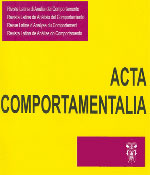An early and brief intervention alternative for problem drinkers in Mexico
DOI:
https://doi.org/10.32870/ac.v6i1.18256Keywords:
treatment, alcoholism self-control, cognitive behavioral therapy, problem drinkers, moderation, outcome evaluation, efficacy, brief interventions, costs and benefitsAbstract
This article presents the results of the application of an out-patient cognitive-behavioral treatment program in Mexico City with a sample of 177 subjects with alcohol related problems. The treatment program is characterized as a motivational intervention that uses self-control procedures, a functional analysis of drinking behavior, and the identification of risk situations for excessive drinking as a bases to promote a change in the individual's addictive behavior. The outcome results show that the subject's pattern of excessive drinking changes to a pattern of moderate drinking as a result of their participation in the treatment program, and that this change is maintained at follow-up at 6 and 12 months after treatment. This change was accompanied by a reduction of their alcohol related problems as well as a increase in their situational confidence in controlling excessive drinking episodes. The implications of these results in the development of public health policies that favor the promotion of early and brief interventions with this populations is examined as well as the need to subject such actions to systematic evaluation of their effectiveness and efficacy.
Downloads
Downloads
How to Cite
Issue
Section
License

<a rel="license" href="http://creativecommons.org/licenses/by-nc-sa/4.0/"><img alt="Licencia de Creative Commons" style="border-width:0" src="https://i.creativecommons.org/l/by-nc-sa/4.0/88x31.png" /></a><br />Este obra está bajo una <a rel="license" href="http://creativecommons.org/licenses/by-nc-sa/4.0/">licencia de Creative Commons Reconocimiento-NoComercial-CompartirIgual 4.0 Internacional</a>.






